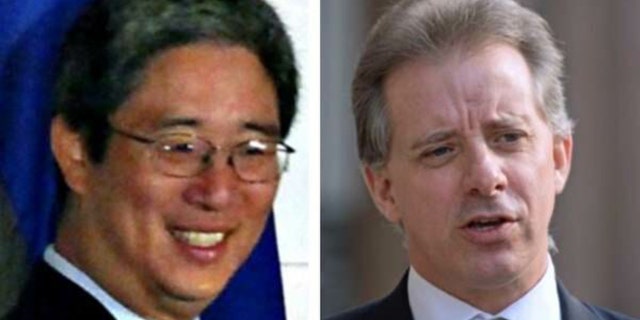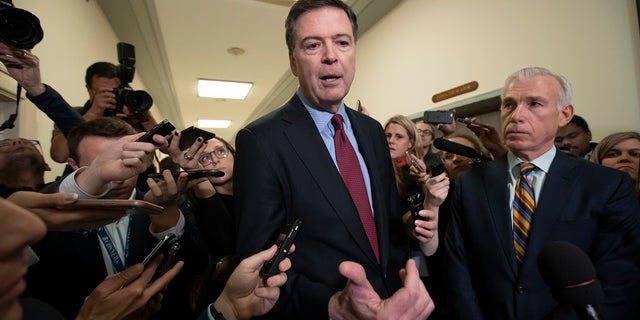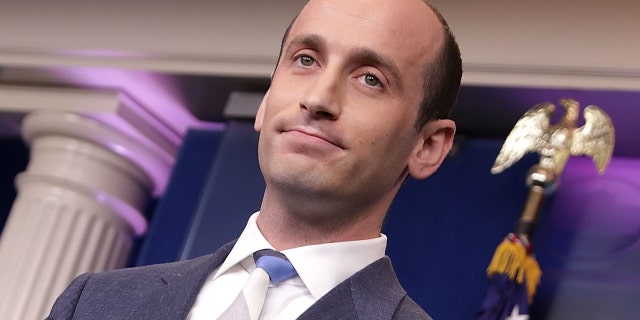A day before fired FBI Director James Comey is set to again testify
behind closed doors with House Republicans, a party leader is predicting
that Special Counsel Robert Mueller's case against ex-National Security
Adviser Michael Flynn will soon be thrown out of court.
California Republican Rep. Darrell Issa
told Fox News' "Sunday Morning Futures"
that the FBI had "tricked" Flynn into not having a lawyer and had
improperly "post-dated" documents to "morph" them into critical evidence
against him. He promised Comey would face tough questioning about the
episode.
"Tomorrow is going to be a very different day for Comey,
particularly in light of what we've learned -- the misconduct during the
Flynn investigation was all about, thanks to a judge that demanded to
understand what had happened," Issa told host Maria Bartiromo, referring
to U.S. District Judge Emmet G. Sullivan's
order last week that led Mueller to turn over key documents in the case.
He
continued: "I would not be surprised a bit if the conviction of Flynn
is overturned, because of the Justice Department and FBI's misconduct --
and that in fact, we go potentially all the way to the Supreme Court,
with new protections -- when the FBI and the Department of Justice lies
to someone and tricks them into making statements, and then charges them
with a lie they entrapped them in. ... This kind of conduct we haven't
seen in a long time."
In
explosive court documents filed last week by Flynn's legal team,
it was revealed that FBI agents in his case deliberately did not
instruct Flynn that any false statements he made could constitute a
crime, and decided not to "confront" him directly about anything he said
that contradicted their knowledge of his wiretapped communications with
former Russian ambassador Sergey Kislyak.
A memo written by
then-FBI Deputy Director Andrew McCabe stated that he called Flynn
and “explained that I thought the quickest way to get this done was to
have a conversation between [Flynn] and the agents only. ... I further
stated that if LTG Flynn wished to include anyone else in the meeting,
like the White House Counsel for instance, that I would need to involve
the Department of Justice."
The court documents also showed that
the FBI's interview report documenting Flynn's statements -- known as an
"FD-302" -- was dated August 22, 2017, nearly seven months after the
actual Flynn interview took place in the White House. Additionally, the
302 that Mueller filed apparently describes an interview conducted by
federal authorities on July 19, 2017 not with Flynn, but with Peter
Strzok, the agent who led the Flynn interview and said he did not feel
Flynn was lying at the time.
Strzok was fired from the Russia
probe in late July 2017 -- just days after he apparently gave the
interview that formed the basis for the 302 -- for his apparent
anti-Trump bias. No audio recording or other transcription of Flynn's comments to the FBI has been produced, and none appears to exist.
It
was not clear from Mueller's heavily redacted Friday filing whether
a written 302 report of Flynn's interview, which FBI policy dictates
should have been written soon after the interview was conducted, ever
existed. Mueller was required to turn over all Flynn-related memoranda
and documents to the court.
ANTI-TRUMP FBI AGENT'S PHONE WIPED AFTER MUELLER FIRES HIM FOR BIAS -- RECORDS OFFICER CAN'T RECALL IF PHONE HAD TEXTS
Additional
documents released by the Mueller team on Friday in
response to Judge Sullivan's order reveal that the decision to
interview Flynn about his contacts with the Russian ambassador was
controversial within the Justice Department. One FBI document said
then-Acting Attorney General Sally Yates “was not happy” when Comey
informed her that the FBI planned to talk to Flynn.
The report
also said several unnamed people back at FBI headquarters “later argued
about the FBI’s decision to interview Flynn.” On Jan. 23, 2017 -- just
one day before the Flynn interview --
The Washington Post, citing FBI sources, reported that the FBI had wiretapped Flynn's conversations with Russian officials and cleared him of any wrongdoing.
Former FBI Director James Comey, with his attorney, David Kelley,
right, speaking to reporters after a day of testimony before the House
Judiciary and Oversight committees, on Capitol Hill in Washington on
Dec. 7.
(AP Photo/J. Scott Applewhite)
Comey admitted last week that he personally directed two FBI agents to
break normal protocol by interviewing
Flynn at the White House because he felt the FBI could get "away with"
it, early on in the Trump administration, which he characterized as
disorganized.
Judge Sullivan technically has the authority to void
Flynn's guilty plea and dismiss the case against him if he unearths
government misconduct, or finds that the plea would constitute a
miscarriage of justice that the court should not accept.
Sullivan
-- who overturned the 2008 conviction of former U.S. Sen. Ted Stevens
after government misconduct came to light -- could take that drastic
step if he finds that the FBI withheld exculpatory witness reports from
the Flynn team, lacks evidentiary basis for its charge, or improperly
coerced Flynn into not bringing a lawyer to his fateful January 2017
interview.
GREGG JARRETT: MICHAEL FLYNN IS INNOCENT
Speaking
to "Fox News Sunday" earlier in the day,
Trump attorney Rudy Giuliani said Flynn had been "railroaded" and
"framed" -- and even though Giuliani acknowledged Flynn had lied to Vice
President Pence about his communications with Russia, he said the FBI's
conduct was still reprehensible.
"What they did to General Flynn should result in discipline," Giuliani charged. "They’re the ones who are violating the law."
HOW FLYNN WAS PUSHED NOT TO HAVE A LAWYER
In
a tweet Sunday, Comey showed no signs of backing down, forcefully
condemning President Trump as a "liar" for criticizing federal
authorities' raid on his former attorney Michael Cohen.
"Remember,
Michael Cohen only became a 'Rat' after the FBI did something which was
absolutely unthinkable & unheard of until the Witch Hunt was
illegally started," Trump wrote on Twitter early Sunday. "They BROKE
INTO AN ATTORNEY’S OFFICE! Why didn’t they break into the DNC to get the
Server, or Crooked’s office?"
In April, federal agents raided
Cohen's home, office and hotel room as part of their investigation into
bank fraud and campaign finance charges he later admitted he had
committed. At the time, Trump characterized the move as an "attack on
our country" and remarked that "attorney-client privilege is dead."
But
later Sunday, Comey emphasized that agents had acted pursuant to a
lawful search warrant, and that attorneys are not immune from searches
-- especially when they are suspected of engaging in wrongdoing on
behalf of clients.
FBI COMPLETELY MISSES JUDICIARY COMMITTEE DEADLINE TO EXPLAIN MYSTERIOUS RAID ON CLINTON WHISTLEBLOWER
"This
is from the President of our country, lying about the lawful execution
of a search warrant issued by a federal judge," Comey wrote on
Twitter. "Shame on Republicans who don’t speak up at this moment — for
the FBI, the rule of law, and the truth."
Any communications with attorneys in furtherance of a new crime are not usually protected by any privilege. A
special master was appointed in the case by a federal court judge to ensure that Trump's privileged communications were separated from non-privileged ones.
Cohen,
who as Trump's attorney also had the ability to compromise Trump's
attorney-client privilege by disclosing their communications himself,
was sentenced this week to 36 months in prison.
The
former Trump loyalist had earlier claimed in court that he had
committed a campaign finance violation "at the direction" of Trump --
although top legal experts and a former
Federal Election Commission chairman have said that obtaining a criminal conviction for such alleged violations is often extremely difficult.
Comey
testified earlier this month behind closed doors with House Republicans
probing his oversight of the Hillary Clinton email probes and the early
days of the Russia investigation. He is expected back on Monday for
more testimony.
After he was
questioned by House Republicans the
first time on Dec. 7, Comey derided the GOP -- which will lose the
majority in the House in January, and with it their subpoena power -- as
hopeless partisans.
"Today wasn’t a search for truth, but a
desperate attempt to find anything that can be used to attack the
institutions of justice investigating this president," Comey said. "They
came up empty today, but will try again. In the long run, it'll make no
difference because facts are stubborn things."
COMEY ADMITS FBI AGENTS BROKE PROTOCOL, GOT 'AWAY WITH' FLYNN INTERVIEW WITHOUT INVOLVING LAWYERS
A
key focus of questioning from lawmakers was Comey's decision to draft
the 2016 statement recommending against filing criminal charges in the
Clinton email probe before the former secretary of state was even
interviewed, as well as the alleged political bias demonstrated in a
slew of text messages and leaks by top FBI officials.
"What they did to General Flynn should result in discipline."
— Trump attorney Rudy Giuliani
But a
Justice Department lawyer prevented Comey -- who had briefly sued to avoid testifying behind closed doors, before
dropping that effort -- from answering all of the Republicans' questions, according to lawmakers at the hearing.
A 235-page transcript of Comey's remarks and the questions posed to him
was later released,
pursuant to an agreement between Comey and House Judiciary Committee
Chairman Bob Goodlatte, R-Va., and House Oversight and Government Reform
Committee Chairman Trey Gowdy, R-S.C.
It showed that Comey
claimed “I don’t know” or “I don’t remember” in response to dozens of
questions concerning key details about his time as FBI chief.
Asked
if he recalled who drafted the FBI’s “initiation document” for the July
2016 Russia investigation, Comey said, “I do not.” He again claimed not
to know when asked about the involvement in that initiation of Strzok,
whose anti-Trump texts later got him removed from the special counsel’s
probe.
When asked if the FBI had any evidence that anyone in the
Trump campaign conspired to hack the DNC server, Comey gave a lengthy
answer referring to Special Counsel Robert Mueller’s investigation as to
why he couldn’t answer.
“Did we have evidence in July of (2016)
that anyone in the Trump campaign conspired to hack the DNC server?”
Comey asked rhetorically. “I don't think that the FBI and special
counsel want me answering questions that may relate to their
investigation of Russian interference during 2016. And I worry that that
would cross that line.”
When pressed further by Gowdy about what
“factual predicate” the bureau had to launch a counterintelligence
investigation, Comey again claimed that answering that question would be
a “slope” that would ask him to reveal what the FBI “did or didn’t know
about Russia activity” as it related to the 2016 election.
“You can't tell us, or you won't tell us?” Gowdy asks.
“Probably
a combination of both ... To the extent I recall facts developed during
our investigation of Russian interference and the potential connection
of Americans, I think that's a question that the FBI doesn't want me
answering. So it's both a can't and a won't,” Comey replied.
MORE DETAILS: COMEY ROUND-ONE TRANSCRIPT RELEASED
The
former FBI director went on to say that anything related to Mueller’s
investigation, to his understanding, would be “off limits" as it is an
ongoing investigation.
Comey was also fuzzy on the eventual
Democratic funding of the research that went into the controversial and
unverified anti-Trump dossier.
Asked when he learned that the firm
behind the dossier, Fusion GPS, was hired by law firm Perkins Coie –
and when he learned that law firm was hired by the Democratic National
Committee – Comey said, “I never learned that” while director.
Comey
also claimed not to know key details surrounding the involvement of
Christopher Steele, the former British spy who authored the dossier.
Asked when Steele was “terminated” as an FBI source, Comey said he didn’t know.
Asked
about Steele’s subsequent contact with Justice Department official
Bruce Ohr, Comey said, “I don’t know anything about that.”


























